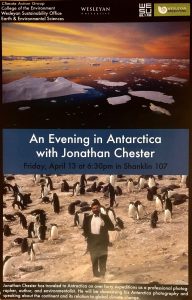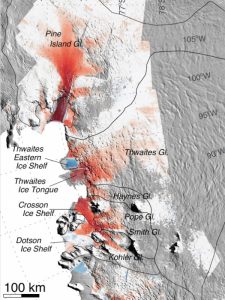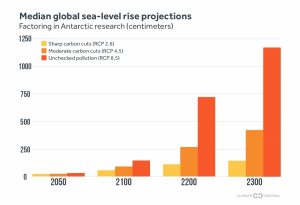 “An Evening in Antarctica with Jonathan Chester” was the title of a presentation I gave on Friday the13th to a select but enthusiastic crowd of Wesleyan University students and staff. This was a great opportunity to share with many of my son’s college peers my passion for the far south and my work as a guide and lecturer for One Ocean Expeditions on polar adventure cruises.
“An Evening in Antarctica with Jonathan Chester” was the title of a presentation I gave on Friday the13th to a select but enthusiastic crowd of Wesleyan University students and staff. This was a great opportunity to share with many of my son’s college peers my passion for the far south and my work as a guide and lecturer for One Ocean Expeditions on polar adventure cruises.
The core or my presentation was a summary of the unique geographical, biological and historical, aspects of the Antarctic and how dramatically it is being impacted by climate change. I last gave a keynote presentation like this to the Kansas Sierra club in 2014. It was sobering to survey the very latest research relating to global warming and see how definitive many findings have become in reporting the gravity of the problem in Antarctica.

Image Credit: NASA/Eric Rignot
The collapse of the West Antarctic ice sheet is now described in categorical terms. Glaciologist and lead author Eric Rignot, of UC Irvine and NASA’s Jet Propulsion Laboratory in Pasadena, California says, “Glaciers in the Amundsen Sea sector of West Antarctica “have passed the point of no return. The collapse of this sector of West Antarctica appears to be unstoppable. The fact that the retreat is happening simultaneously over a large sector suggests it was triggered by a common cause, such as an increase in the amount of ocean heat beneath the floating sections of the glaciers. At this point, the end of this sector appears to be inevitable.” The study presents multiple lines of evidence, incorporating 40 years of observation.
Data from theses recent studies is now being incorporated into the many models that attempt to predict the sea level rise and the results are frightening.
Climate Central reports, “Global average sea level is expected to rise by one foot between 2000 and 2050 and by several more feet by the end of the century under a high-pollution scenario because of the effects of climate change.”
My lecture was videoed and I will post a link to it as soon as it becomes available.
The main report on Antarctic and Climate by the SCAR was produced in 2009 but annual updates are presented at the Annual Antarctic Treaty consultative meetings. The most recent 2017 report has been incorporated into a wicki Antarctic Climate Change and the Environment.
Many thanks to Cormac Chester and these organizations for supporting my presentation: Wesleyan Green Fund,
College of the Environment,
Dept. Earth & Environmental Sciences,
WESU Middletown 88.1 FM,
Wesleyan Sustainability Office,
Wesleyan Argus,
Climate Action Group Wesleyan.